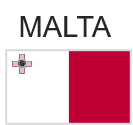This table here below aims at providing an overview of all the initiatives, such as the political communications, guidelines, and legislation, related to interoperability that have been put in place in Malta.

National Interoperability Framework
The National Interoperability Framework (NIF) is a set of standards, policies, and guidelines that ensure that information and communication technology (ICT) systems can communicate and share data seamlessly. It promotes the development of interoperable systems that facilitate data exchange and collaboration between different organizations and levels of government. The NIF provides a common language and a framework for ensuring that ICT solutions are compatible, secure, and reliable, which enhances the efficiency of public services and improves citizen outcomes.
|
National ICT Interoperability Framework (NIF) Year: 2009 |
The interoperability framework is a set of standards and guidelines aimed at ensuring the provision of services for public administration institutions, enterprises and citizens both in the national and the European context. This document does not present policy, regulation and/or compliance perspectives as these activities fall directly within the ICT Governance and the Compliance Management Frameworks respectively. Related policy documentation is issued separately on the GMICT Policy portal to compliment the framework’s guidance. A new NIF is planned to be published in 2022 and has the primary goal of encompassing and substantiating the most recent EIF, providing an action plan tailored to the national context. |
Good Practices
This section provides examples at the national level in line with a selection of different thematic areas of the European Interoperability Framework (EIF). Further initiatives and good practices are available in the country’s Digital Public Administration Factsheet.
Malta has an Open Source Software Policy to encourage the adoption of cost-effective and non-disruptive Open Source Software (OSS) throughout the Public Administration.
Citizens, businesses, and the public administration are involved in the development of services throughout their lifecycle, as co-creation efforts. For instance, a number of selected representatives of the target audience are invited to use early versions of services, in order to ensure they function effectively and meet user needs. Training sessions are also offered to public officers (both with and without a technical background) to obtain feedback on mobile government services. Feedback from both of these instances is then used to update the services in question. Moreover, feedback on existing services is taken into consideration when new services are being developed.
In Malta, there is a defined quality assurance plan which is currently being implemented to categorise all registries, including base registries. After the owner of each registry is identified based on the legal requirement for the registry in question, the owner will be required to use the provided tools to assess the quality of the data.

